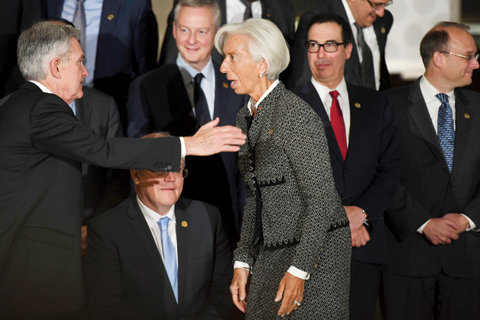Excess trade surpluses in China, Germany aggravate tensions
 BUENOS AIRES: IMF Director Christine Lagarde (center) speaks with US Chairman of the Federal Reserve Jerome Powell (left), after the family picture of the G20 Finance Ministers and Central Bank Governors meeting in Buenos Aires on Sunday. — AFP
BUENOS AIRES: IMF Director Christine Lagarde (center) speaks with US Chairman of the Federal Reserve Jerome Powell (left), after the family picture of the G20 Finance Ministers and Central Bank Governors meeting in Buenos Aires on Sunday. — AFPWASHINGTON: The International Monetary Fund said yesterday that the US dollar is over-valued, China's yuan is in line with fundamentals and nearly half of global current account balances are now excessive, adding to growth risks and trade tensions.
The IMF, in its annual External Sector Report, which assesses exchange rates and current account surpluses and deficits, also said current account surpluses and deficits are becoming increasingly concentrated in advanced economies. The report was based on data and IMF staff projections as of June 22. However, China's yuan has dropped significantly in recent weeks as trade tensions with the United States have intensified.
China's yuan hit a fresh 13-month low yesterday of 6.8295 to the dollar as authorities in Beijing signaled further monetary loosening to support the economy amid an escalating tariff war with the United States.
US Treasury Secretary Steven Mnuchin told Reuters exclusively on Friday that he was concerned about the yuan's fall and the Treasury is "going to very carefully review whether they have manipulated the currency.".
The IMF said its staff estimated China's current account surplus grew slightly last year to 1.7 percent of gross domestic product and listed China among countries with excessive balances. Other excessive surplus countries cited by the IMF included Germany, South Korea, the Netherlands, Sweden and Singapore.
Countries that it cited as having excessive current account deficits-those that borrow too much-included the United States, Britain, Turkey and Argentina. The report said IMF staff assessed the US dollar again to be over-valued compared to levels implied by medium-term fundamentals, by about 8 percent to 16 percent last year.
US President Donald Trump has broken with protocol in recent days and complained that Federal Reserve interest rate hikes were causing the dollar's value to rise and to erode the US "competitive edge" in exports.
Trade tensions
As growing trade frictions engulf much of the world, the IMF warned that large trade surpluses in Germany and China together with the large US deficit could exacerbate that conflict.
But in a message that seem directed largely at US President Donald Trump, the IMF once again warned against using protectionist measures to address trade issues, since they can harm growth without resolving the problem. In addition, US fiscal stimulus-like the massive tax cut approved in December-"is leading to a tightening in monetary conditions, a stronger US dollar, and a larger US current account deficit," the IMF said.
Those are precisely the developments Trump railed against on Twitter last week, breaking with longstanding tradition to chastise the Federal Reserve for raising interest rates, which has caused the dollar to strengthen.
Trump has pursued a multi-front trade confrontation with key economies, especially China, but also has singled out Germany and the European Union in general for allegedly treating the US unfairly. The tariffs he imposed have angered trading partners and prompted swift retaliation.
Germany's surplus is "substantially stronger" than justified by the state of the economy, while those in China and South Korea were classified as "moderately stronger," as was that of the European Union.
China 'overly reliant' on credit
Those countries "should focus their efforts on reforms to reduce excess saving, through safety net and pension reforms," the report said. For Germany, "boosting public investment would also help reduce excess surpluses."
That has been a long-standing recommendation of the IMF and other economists who have urged Germany to spend more and encourage more demand to help with the global recovery. Germany posted a surplus of eight percent of GDP last year which is in part fueled by the fact the euro's value has been held down by the weak economic performance in member nations, including Greece, which makes German exports more competitively priced.
In China, the IMF cautions that the economy has been "overly reliant on credit and investment (which) could culminate in an abrupt growth slowdown and a resulting resurgence of large external surpluses."
That outcome "could be met with stiff protectionist responses," the report said. And those export-led nations cannot continue to rely on demand from debtor countries, most notably, the United States, the IMF said.
In the short term, if the US trade deficit continues to widen from 2.4 percent of GDP last year-exacerbated by fiscal stimulus and a stronger dollar-it risks "intensifying the US administration's approach to reducing its deficit through trade measures," the report said.
"New trade barriers and possible retaliatory actions could derail global growth, with likely only limited impact on excess global imbalances." The report noted that allowing increased immigration-something Trump strongly opposes-also could help the United States. - Agencies










